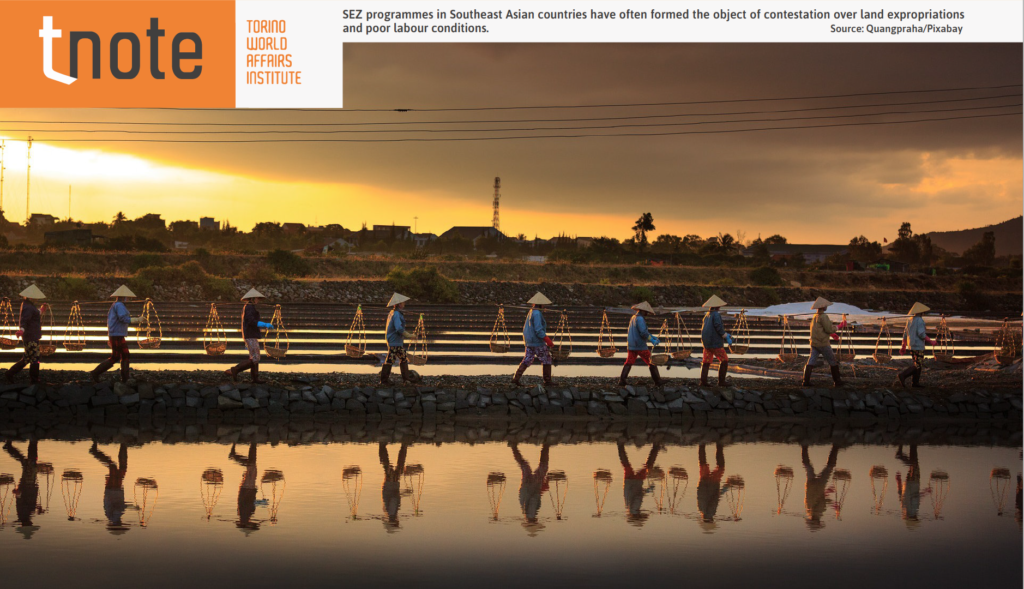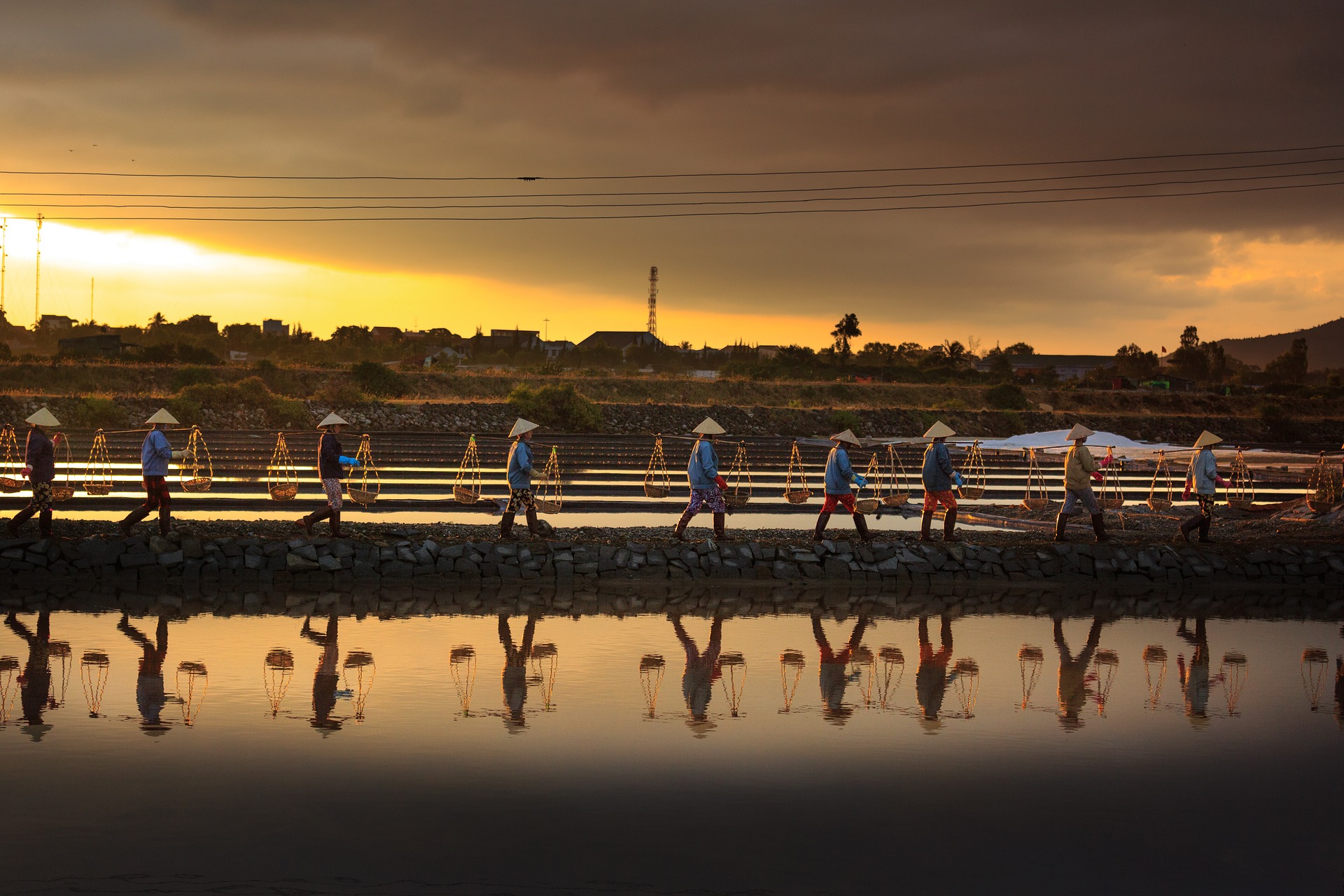
From the early 1990s, when the Asian Development Bank (ADB) initiated the establishment of the socio-economic corridors, domestic profit creation in continental Southeast Asia began to unfold noticeably. This all happened at a time when global and local financial crises were putting a lot of strain on many economic systems around the world. It gradually became apparent that this was possible thanks to the development of Special Economic Zones (SEZs), i.e. geographically demarcated areas close to national boundaries (ports and airports included), specifically designed to attract Foreign Direct Investment (FDI) and Official Development Assistance (ODA), to augment highly productive cluster economies, create logistics hubs, and to standardize national policies with regional ones. A plethora of studies confirms the widespread economic development that the corridors and SEZs have brought about. Just as many studies, however, warn us of the inevitable by-products of large-scale and rapid profit making. For example, whereas per capita GDP in continental Southeast Asia averages USD 2,500, investments funnelled into a single SEZ can easily add up to USD 12 billion; one would expect some sort of healthy redistribution into the local economies hosting the SEZs, but field observations conducted in the region every year since 2008 clearly show worsening social conditions for the border populations, thus questioning the very paradigm of how SEZs have been administered in the past three decades.
In Southeast Asia there are more than five hundred active SEZs, mostly in Vietnam and Thailand, but also strategically in Myanmar, Laos and Cambodia. They can be as small as a dozen hectares and as large as hundreds. Clearly, this already points to a serious issue: forced land expropriation. Land grabbing is not a new occurrence in Southeast Asia. But nor is the widespread discontent and social outcry around the discriminatory and forceful relocation policies adopted by the governments and their proxies. Before the era of the so-called ‘rice frontier’ in the late 1990s, during which low-cost technology was developed for extensive irrigation and water-logged land reclamation, most of the remote areas in the region had close to no commercial value. For this reason, ethnic minorities and hill tribes began to (re)settle around the borders, due to areas’ isolation and loose control by the central governments. This gave them more freedom, and cross-border activities began to thrive. So, when we consider the sheer size of some of the SEZs in the region – such as the Dawei in southern Myanmar, which at 250 sq. km is larger than the whole of Singapore – the severity of the issue becomes apparent. The forced relocation of already discriminated-against individuals has deprived them of those minimal advantages they had gained over the generations, from local education to labour stability.
The development of the SEZs has undoubtedly attracted an immense labour force. The idea was to create a new working class made of semi-skilled workers drawn from the agricultural sector, by providing them with the necessary skills to operate in industrial premises. However, while this is partly true and easier to achieve in areas closer to urban centres, in the case of remote borderlands, most of the farmers have little, if at all, technical skills. By establishing a SEZ, the value of the neighbouring lands inevitably increases. In most cases, this is enough to convince those farmers who were not relocated, to sell their properties, blinded by the mirage of quick and easy profits, and lured by political promises. However, the SEZs work with a business mindset, and it is undoubtedly cheaper to hire migrant workers fit for the job than it is to train farmers. Hence, once the mirage dissolves, it has already become impossible for those farmers to acquire their former lands back, as market prices would have inevitably risen in the meantime. At best, they become daily workers with nowhere else to go. Nothing close to the envisaged birth of a new working class.

SEZ programmes in Southeast Asian countries have often formed the object of contestation over land expropriations and poor labour conditions. Source: Quangpraha/Pixabay
SEZs are most profitable when the products are, at least in part, locally purchased. This makes them financially safer in times of regional uncertainty. Many of them, it turns out, seem to have these numbers in place. However, our field observations unveil the reality behind the statistics. If we look for example at the Moc Bai-Bavet economic zone, located on the border between Viet Nam and Cambodia, along the all-important corridor linking Ho Chi Minh City to Phnom Penh, we would see how the local market is driven by informal trade managed by illegal local syndicates. Locals are in fact allowed to buy tax-free products, although in smaller quantities decided by each government. This has driven the aforementioned alienated farmers to organise themselves, oftentimes under the leadership of local mobsters, who then set up satellite black markets, buying and reselling everything, and targeting all those businesses that come and gather around the SEZs to profit from the spillovers of the large scale market, but don’t have direct access to the SEZs. A state-of-the-art, SEZ-fuelled contraband. In 2019, Viet Nam alone lost USD 432 millions of state revenues exactly because of this phenomenon, and only with regard to a single contraband product among the many: cigarettes.
Following this worrisome process of progressive social exclusion incurred by the local populations dwelling the areas in and around the SEZs, we lastly come across another serious social byproduct of their development: the rising of the entertainment industry, in all of its most degrading facets, i.e. gambling, sexual exploitation, infectious diseases, human trafficking, and the proliferation of illegal activities in general. If we were to visit another successful SEZ, the one in Poipet–Aranyaprathet on the Cambodian-Thai border along the Siem Reap-Bangkok route, we would be immediately struck by the glittering presence of the so-called “casinos strip”. It is a narrow strip of land on the Cambodian side were a number of high-end casinos, hotels and parlours have been built and are managed by very special agencies to please costumers almost exclusively coming from Thailand. Cambodians who do not work inside the SEZ are in fact prohibited from entering the whole area. These agencies, always connected to the underworld, offer a wide range of diversely advertised products, such as drugs and under-age prostitution. The police in Poipet are arguably the most corrupt in the whole country, and it just seems that everyone tries to profit from this hell on Earth. Fake agents lure poor farmers into selling their children into “boarding schools”, not knowing they will be exploited in the most heinous ways. Used as porters to conceal drugs inside their bodies, which they will eventually be forced to sell likely to the same customers who also bought the drugs. They either die due to the rupture of the drug involucres, or because of the abuses, or they simply get ill because of the spreading of infectious diseases and die unattended.
The design and subsequent establishment of the SEZs has undoubtedly been a powerful growth engine for domestic and regional markets in Southeast Asia. Economic profits and the added-value of an organised regional system have brought about undeniable benefits, not only for the economies, but also for the geopolitical balance of the region with particular regard to China and India. It is, however, greatly irresponsible and unethical to overlook the immense social byproducts afflicting the human security of the many individuals suffering from, among others, the unsettling long-term consequences briefly described. It is about time all of the involved stakeholders take a more proper stance on the biased management of SEZs in the region, hopefully prioritising people against numbers.
Author
Gianluca Bonanno is Research Fellow at T.wai and President of IPSO – International Peace and Sustainability Organisation in Kyoto.
Download


Copyright © 2025. Torino World Affairs Institute All rights reserved
